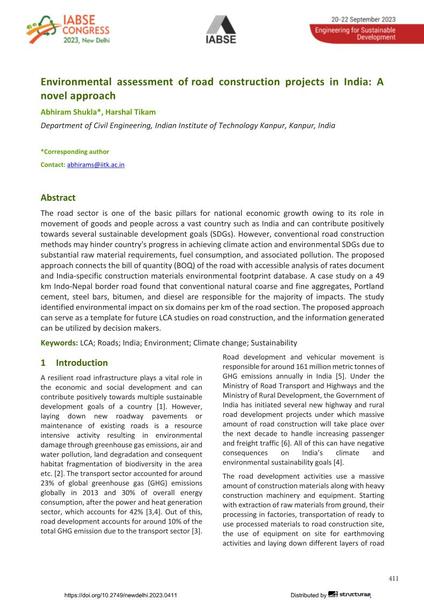Environmental assessment of road construction projects in India: A novel approach

|
|
|||||||||||
Bibliographic Details
| Author(s): |
Abhiram Shukla
(Department of Civil Engineering, Indian Institute of Technology Kanpur, Kanpur, India)
Harshal Tikam (Department of Civil Engineering, Indian Institute of Technology Kanpur, Kanpur, India) |
||||
|---|---|---|---|---|---|
| Medium: | conference paper | ||||
| Language(s): | English | ||||
| Conference: | IABSE Congress: Engineering for Sustainable Development, New Delhi, India, 20-22 September 2023 | ||||
| Published in: | IABSE Congress New Delhi 2023 | ||||
|
|||||
| Page(s): | 411-419 | ||||
| Total no. of pages: | 9 | ||||
| DOI: | 10.2749/newdelhi.2023.0411 | ||||
| Abstract: |
The road sector is one of the basic pillars for national economic growth owing to its role in movement of goods and people across a vast country such as India and can contribute positively towards several sustainable development goals (SDGs}. However, conventional road construction methods may hinder country's progress in achieving climate action and environmental SDGs due to substantial raw material requirements, fuel consumption, and associated pollution. The proposed approach connects the bill of quantity (BOQ} of the road with accessible analysis of rates document and India-specific construction materials environmental footprint database. A case study on a 49 km Indo-Nepal border road found that conventional natural coarse and fine aggregates, Portland cement, steel bars, bitumen, and diesel are responsible for the majority of impacts. The study identified environmental impact on six domains per km of the road section. The proposed approach can serve as a template for future LCA studies on road construction, and the information generated can be utilized by decision makers. |
||||
| Keywords: |
sustainability LCA life-cycle analysis India climate change environment roads
|
||||
